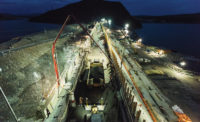Canadian provinces and cities are bucking calls for any sweeping, Boston-style construction shutdown as they eye the deadly COVID-19's growing economic fallout.
But some megaproject owners have opted to shut sites or curtail operations.
According to new federal statistics, the number of confirmed cases jumped on March 22 to 1,302 from 1,099 the day before,.
But with efforts to contain the virus triggering a major economic downturn, provincial leaders in Quebec, British Columbia and Ontario are either accelerating plans for big, public infrastructure projects or insisting on keeping existing work rolling.
No Provincial Shutdown
Quebec Premier Francois Legault recently announced that major education and healthcare infrastructure projects will start earlier than planned to pick up the slack as projects in the private sector halt work, while British Columbia Premier John Horgan is touting plans for roughly $23 billion in infrastructure work over three years, including $4.1 billion for new hospitals and $4.8 billion for roads, bridges and transit, in a bid to keep the local economy afloat amid the COVID-19-driven downturn.
And in Ontario, Premier Doug Ford noted pointedly that construction sites would remain open when he rolled out sweeping emergency measures at a March 17 press conference, including closure of schools, day care centers, theaters, concert venues and bars and restaurants.
Construction is a major employer in Canada, with more than 1.1 million tradespeople working on projects across the country as of 2019, according to BuildForce Canada.
The moves stand in contrast to Pennsylvania, Boston and others that ordered a broad halt this week to construction activity.
“This is not a provincial shutdown,” Ford said at the press conference.
Still, the efforts to shield the country’s construction business from a complete shutdown are growing more complicated by the day, with a number of individual projects scaling back or limiting activity in a bid to stop the spread of the virus.
The government owned B.C. Hydro announced this week that it will “scale back certain construction activities” on the site of a giant, $7.4 billion hydroelectric dam, Site C in the Fort St. John region.
The project, which employs up to 4,000 people, is one of the big infrastructure projects that provincial leaders in British Columbia are counting on to keep the local economy afloat.
Megaprojects Scale Back
B.C. Hydro did not give any numbers on how many jobs would be affected but said it planned to reduce the number of workers staying at an “accommodation lodge” on the worksite.
The utility noted it had already taken several steps to lower the risk of infection, including more intensive cleaning, restricting common areas, and barring self-service stations in the dining room.
Other, off-site works, such as the realignment of a local highway and transmission line installation will continue since they do not involve workers staying at the company-owned accommodation lodge.
“BC Hydro is modifying its work activities on the Site C project ... in response to the increasing escalation of the COVID-19 pandemic,” the utility said in a statement.
Manitoba Hydro also said on March 19 that it would temporarily scale back work on the Keeyask hydro plant located 725 kilometers from Winnipeg and 10º south of the Arctic Circle, and suspend travel in and out of the site due to the COVID-19 pandemic.
Manitoba Hydro said the temporary reduction of personnel with scaled-back work and other restrictions would last four to eight weeks. About 600 supervisors and other construction staff will remain on site.
The project scalebacks come on the heels of LNG Canada’s decision to send home 1,500 workers – half of those working on the $27.8 billion natural gas export terminal on the province’s Pacific coast.
The aim, like B.C. Hydro, is to reduce the number of workers in the field living in close quarters on housing at the worksite.
The Coastal GasLink project, which employed more than 1,100 crew members building a pipeline that will feed the terminal, has also sent some workers home.
Still Supply Chain Missing Links
John Gamble, president and CEO of the Association of Consulting Engineering Companies/Canada, said he is not aware of any local or provincial governments that have shut down construction.
Gamble noted government leaders and industry officials in Canada are trying to balance health concerns with the need to keep infrastructure projects moving amid growing economic challenges.
Overall, engineering firms, with their ability to work remotely, have seen less of an impact than contractors from the spread of COVID-19, he said.
As of March 19, Canada had 846 confirmed COVID-19 cases, according to Infection Prevention and Control Canada.
To date, an even bigger concern has been supply-chain problems, which have led to shortages of key materials at construction sites, he said.
“Past economic challenges around the world and across Canada have demonstrated the effectiveness of infrastructure as a form of stimulus that will be needed through the recovery from the crisis,” Gamble said.
“In meantime we need to find a way our teams working through the crisis so that A/E/C firms retain the capacity to deliver.”





Post a comment to this article
Report Abusive Comment